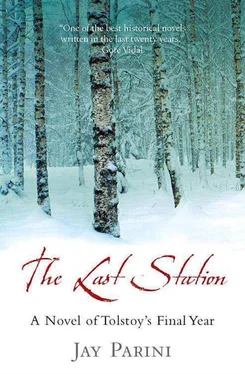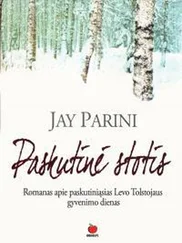‘She is preparing to suffer,’ Lyovochka whispered in my ear.
I genuflected before the icon, kissed it, and greeted everyone politely. Sergey Nikolayevich passed around a tray of stale bread and salt. I was eager to get inside, where it was cool. We sat opposite one another in the front hall, and tea was passed around from the antique samovar. It was lukewarm and tasted of burnt metal.
‘We are delighted to welcome you,’ Sergey said. He seemed short of breath and deeply uncomfortable in the presence of his younger brother’s new wife – though he would soon enough fall in love with my sister Tanya. Aunt Toinette nodded heavily, looking a thousand years old. I was introduced, one by one, to the three servants who were living behind the kitchen. Only three servants for a house of that size!
That night, after another round of animalistic sex, Lyovochka fell into a snoring slumber, but I lay awake, my nerves tingling, wondering what I had done. Lyovochka woke halfway through the night and shouted ‘Not her! Not her!’
‘Darling,’ I said, shaking him. ‘What on earth is wrong?’
‘I must have been dreaming.’
‘About me?’
‘No.’
‘About what?’
‘Do I always have to confess my dreams? Is that what marriage means to you?’
I apologized and let him drift back to sleep in my arms. But I know now that, yes, that is what marriage is about. Or should be about.
During those first lonely months, I kept thinking about Mama, wondering what the first months of her married life were like. Her marriage was not perfect. Papa was something of a flirt, which did not make life easy. She, of course, had her own flaws. I have since learned, through Lyovochka, about her dalliance with Turgenev, that they were lovers. What a literary family we have turned out to be!
Mama was fifteen when she met Papa. She had been ill for several weeks at her parents’ country house in Tula. A mysterious fever had consumed her, and the prognosis was not good. In desperation, her father turned to a famous young doctor from Moscow, Dr Andrey Behrs, who at age thirty-three was making a name for himself at court. This handsome young doctor was a friend of Turgenev, who had a summer estate in the nearby district of Orel.
Once Papa set eyes on Lyubov Alexandrovna, his heart was no longer free. Her pale skin and dark eyes, her black hair and clean, broad forehead obsessed him. He remained at her bedside for a month, sitting up with her through the night when her fever rose. His courtly manners impressed Alexander Islenyev, my grandfather, though he buckled when his daughter announced, at the end of the doctor’s supposedly medical visit, that she wished to marry her physician.
‘My dear, he’s eighteen years your senior!’ he said.
‘I love him,’ she said flatly.
‘Impossible!’ her mother cried. ‘You’ve been at death’s door. You’re not fit to make such a decision.’ She had bigger plans for her daughter. A physician was not – after all – a gentleman.
Most horrified of all was my great-grandmother, who said, ‘I would sooner have Lyubov marry a musician – or die!’
My somewhat indelicate grandmother also pointed out that Dr Behrs was not a Russian at all; he was German. ‘Possibly even a Jew,’ she whispered in her granddaughter’s ear.
Mama, typically, would not budge. Her family knew, or should have known, that once she had decided on a course of action the argument was closed.
I don’t know exactly what went wrong with Mama’s marriage, nor why she took up with Ivan Turgenev, who broke her heart.
‘Turgenev was a rascal and a fop,’ Lyovochka says, all too frequently. ‘His novels bore me. They are French novels written in Russian.’ It is not enough for a writer to succeed; his friends must fail.
I talk about the marriage of my parents glibly now, but it hurt me to discover the extent of their misery. At least, during my first lonely months at Yasnaya Polyana, I had the myth of their happiness to aid and abet my spirits. I had the story of their life together, which I told and retold to myself.
Now even that story has deserted me.
LETTER TO I. I. PERPER
10 MARCH 1910
Here is a book translated from the German under the title Horrors of Christian Civilization . It was complied by a Tibetan lama who studied at German universities for several years. The title of the book is self-explanatory. Whether it was written by a real Buddhist or someone who used that form as a convention, as in Montesquieu’s famous book Persian Letters , I can’t say. In any case, the book is fascinating and instructive.
Recently Buddhism has become increasingly free from the overlays that have burdened it in the past, just as the Christian world has begun to understand its true essence. Also, one sees more and more people converting from Christianity to Buddhism in both Europe and America.
Apart from the philosophical depth of its teaching, so well explained by Schopenhauer, the moral basis of this teaching strikes me as particularly attractive. I would isolate five essential commandments in Buddhism:
1. Kill no living creature deliberately.
2. Do not steal what belongs to others.
3. Do not capitulate to sexual desires.
4. Tell the truth.
5. Avoid drugging yourself by alcohol or smoking.
One can hardly help thinking what a great change would occur in the world if people knew these commandments and thought them at least as binding as the need to perform certain external rituals.
LETTER TO V. G. KOROLENKO
26–27 MARCH 1910
I just listened to someone reading your essay on the death penalty. Much as I tried, I was unable to restrain myself – not just from shedding a tear but from actually sobbing as I listened. I can barely express to you my thanks and affection for writing this article, which is marvelous in its expression, its thought, and – singularly – its feeling.
It should be reprinted and distributed in the millions. No speeches at the Duma, no tracts, no plays or novels could have even a thousandth of the impact.
It could have such influence because it stirs a powerful sense of compassion for the suffering experienced by these victims of human insanity; one can’t help forgiving whatever their crimes may have been, and (however much one might like to) one can’t forgive those responsible for their suffering. Also, your article makes one gape in disbelief at the self-confident ignorance of those who commit these dreadful acts, and at the uselessness of it all, since it’s obvious that capital punishment has the reverse effect of that intended, as you show. Apart from this, your article will arouse another feeling, one I have experienced to a high degree – a feeling of pity, not just for those who were murdered but also for those duped, simple, manipulated people – the guards, jailers, executioners, and soldiers who commit such deeds with no sense of what they have done.
One thing that brightens my heart is that an article such as yours unites many readers who are not deceived or perverted. They are united by a single ideal of goodness and truth, and this blazes out ever more brightly – no matter what its enemies may try to do.
I woke early, startled by what sounded like someone shuffling in the hallway outside my bedroom. Sergeyenko is by nature suspicious, so I wouldn’t put it past him to loiter outside my door. He is by now aware that Masha and I have formed an intimate friendship. During meals, we sit together at the narrow pine table in the dining room of Telyatinki, and this is enough to raise suspicion. Nothing is really forbidden at Telyatinki, but there are tacit standards that cannot be ignored.
Читать дальше












